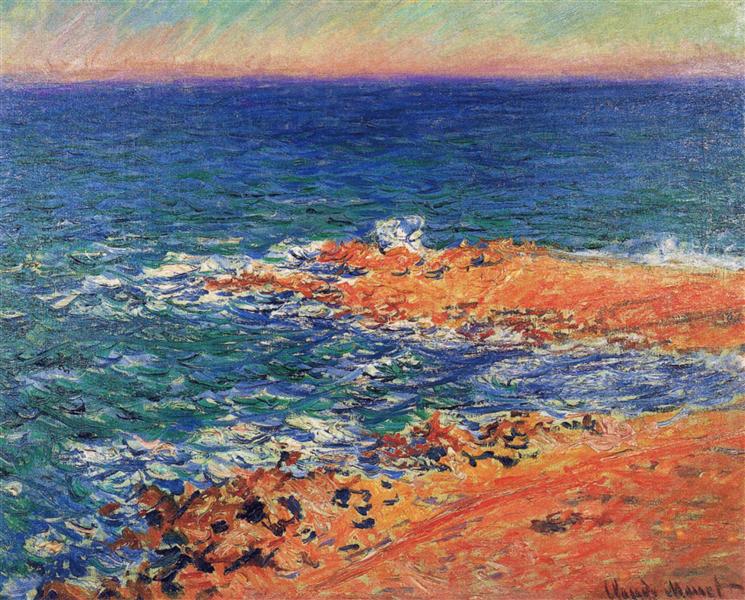Opis
Claude Monet's The Great Blue Sea at Antibes, created in 1888, is a magnificent example of the impressionist approach that the artist cultivated throughout his career. In this painting, Monet captures the essence of the Mediterranean, revealing a world where water becomes the protagonist, bathed in sunlight and color. The choice of Antibes as a setting is not incidental; this region of the Côte d'Azur represented a meeting place between light, water and everyday life, all elements that Monet was able to capture masterfully.
From the first glance, the work stands out for its rich palette of blues, which is intertwined with shades of turquoise and green. These colours, applied with loose and vibrant brushstrokes, evoke the luminosity of the Mediterranean waters and their interrelation with the sky. The surface of the water, although static in its representation, suggests a subtle and eternal movement, reflecting Monet's fascination with light and its effect on the landscape. Through his technique of short and rapid brushstrokes, the artist manages to capture the vast immensity of the sea and its constant dialogue with the environment.
The composition of the painting is notable for its simplicity and its ability to invite the viewer to lose themselves in the landscape. In the foreground, subtle hints of white foam can be seen on the waves, suggesting a slight movement in the sea. Far away on the horizon, the water line meets the sky, where a smooth transition of colors can be seen, creating an atmosphere of calm and serenity. This use of the horizon line highlights not only the vastness of the seascape, but also the promise of the unknown that lies beyond.
Within this work we find no human figures or narrative elements, which is characteristic of Monet's style at this stage of his career. By eliminating characters, the focus is on the sensory experience offered by the landscape itself. This choice allows the viewer to connect intimately with the natural surroundings, creating a sense of immersion in the scene. The lack of distractions adds a layer of introspection, inviting a quiet contemplation of beauty.
Monet, along with his contemporaries, pioneered the capture of natural light and atmosphere, seeking to reflect momentary impressions rather than depict reality with academic rigor. This work aligns with other examples of his work, such as “Impression, Sunrise,” where atmosphere and light become the foreground. “The Big Blue Sea at Antibes” is a testament to his dedication to exploring visual perception, as well as his ability to depict nature in its purest form.
In the context of art history, this piece stands out not only for its aesthetic beauty, but also for its significance as an integral part of the Impressionist movement. Monet, as the leader of this avant-garde, was an innovator who dared to challenge the conventions of his time, and “The Big Blue Sea at Antibes” encapsulates that quest. Through this work, we celebrate not only the grandeur of the landscape he painted, but also his enduring legacy in modern art, where the visual experience is transformed into a form of emotional connection with the natural world.
KUADROS ©, a famous painting on your wall.
Hand-made oil painting reproductions, with the quality of professional artists and the distinctive seal of KUADROS ©.
Painting reproduction service with satisfaction guarantee. If you are not completely satisfied with the replica of your painting, we will refund 100% of your money.

